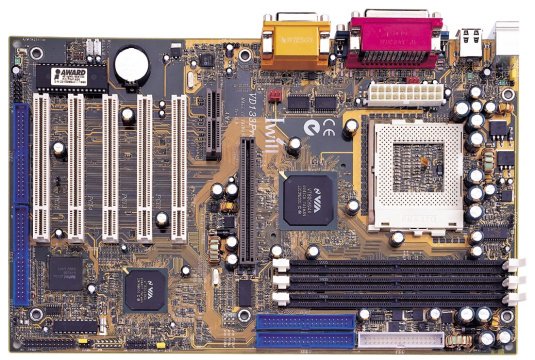
|
Good, bad, or indifferent. Whatever your thoughts and/or feelings may be of the VIA Apollo Pro 133A chipset, the fact remains that it has given a strong boost of support to Intel's newer range of processors.
85% Rating: 
|
|
|
|
Home >
Reviews >
Motherboards >
Iwill VD133Pro |
|
|
First Impressions
Upon first look,
what catches the eye is the inclusion of 2 additional HDD headers which are
aligned parallel to the PCI slots on the edge of the board. These headers make
up the IDE RAID subsystem. The engineers at Iwill seem to have done a fantastic
job at positioning these headers to minimize the amount of PCB real estate used
as well as avoiding the potential reduction of airflow due to cable
clutter.
As ISA is nearing complete obsolescence, Iwill
rightfully decided not to include the ISA slot but rather focused on the expansion of
the 5 PCI slots. Also included is an AMR slot. Though not many AMR
devices are available, we may soon be expecting a plethora of AMR devices on
the market. However, no indication of this has been given. Directly behind the CPU are
3 DIMM slots which allows for 1.5GB SDRAM, sufficient enough for most users
out there.
The VD133Pro supports up to four USB ports (2 are standard, the other 2
optional), WOL and WOM headers as well as an on-board AC97 audio CODEC (which
can be disabled). Located behind the DIMM slots are your NORMAL ATA/66 HDD and
FDD headers. When I say normal, I am referring to the fact that these channels
are independent of the RAID subsystem and do not support any RAID functionality
at all.

Layout wise, it is certainly pleasing to see that the VD133Pro does
exhibit a rather clean and neat design. Most of the components (slots, sockets,
jumpers, etc.) are arranged in such a way as to promote easy access. For the
most part, a user may not have to play the dreaded game of "finger twister" when
wanting to modify system settings / hardware after the board is installed.
However, there are a couple of exceptions.
The location of the ATX power
connector is just in front of the Socket 370 area. As the board is based on
Socket 370, this poses a smaller problem compared to Slot 1 or Slot A
motherboards as the actual height of the CPU is much less with PPGA / FC-PGA
CPUs. Having a lower (height wise) CPU allows easier access to the power
connector as the distance needed to reach down for the ATX power cable is
greatly minimized.
Cabinet headers are located on the far left side at
the back edge of the board. For full length PCI cards, adding and removal of
these cabinet cables may pose a slight problem. Other than these two issues, I
am happy to say that this is one of the cleanest boards that I have come across
(especially so since the VD133Pro sports extra RAID headers).
Another
goodie that Iwill incorporated is a small light green LED located on the front
left corner of the board which is for diagnostic purposes. Again, yet another
small point which certainly deserves attention.
Hardware
Monitoring
We were surprised to see Iwill use a Winbond W83781D hardware
monitoring controller considering the 686A Southbridge does provide good
monitoring capabilities. With that being said, the chip provides monitoring for
CPU & system temperatures, CPU & system fan speeds as well as Vcore,
2.5, 3.3, 5 and 12V monitoring.
Yet another question mark crossed our
faces when we learned that the VD133Pro monitors CPU temperature through a
surface mounted thermistor and does NOT make use of the 686A support for the
on die thermistor found in the Celeron and Pentium III CPUs... with the latter
being a bit more accurate. For monitoring temperatures during actual computer
usage, hardware monitoring software has been included with the motherboard. This
is something that overclockers can certainly
appreciate.
|
